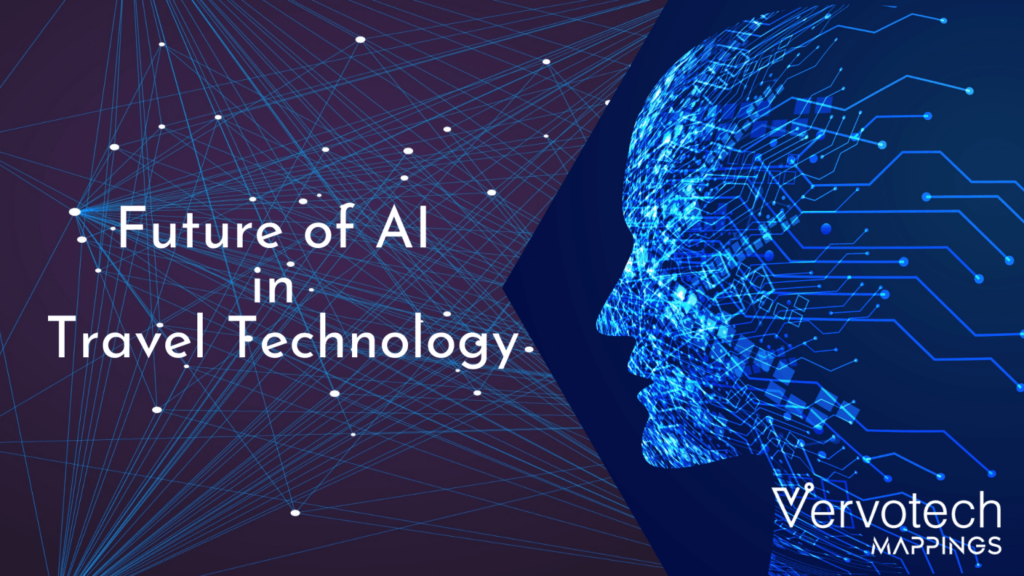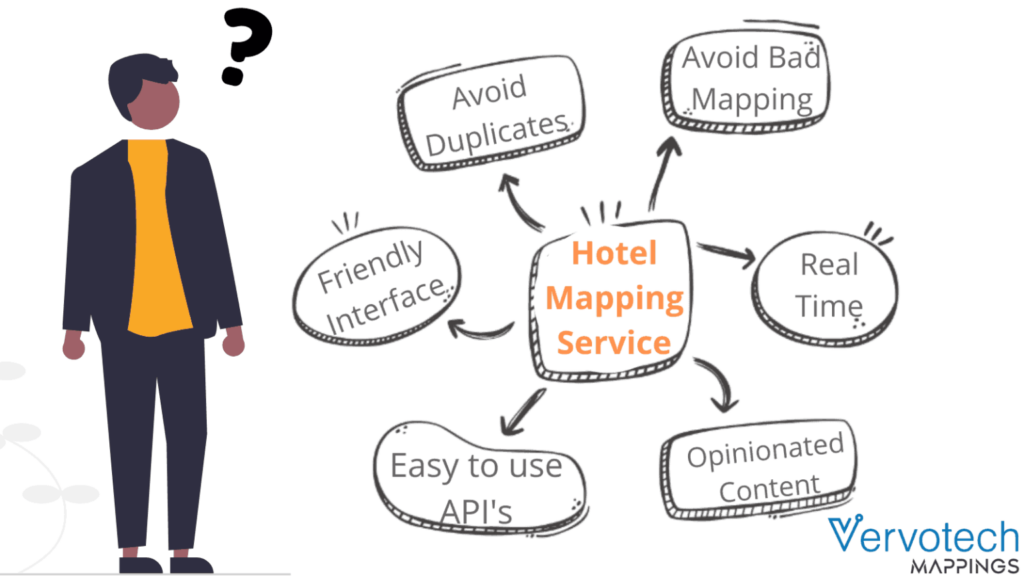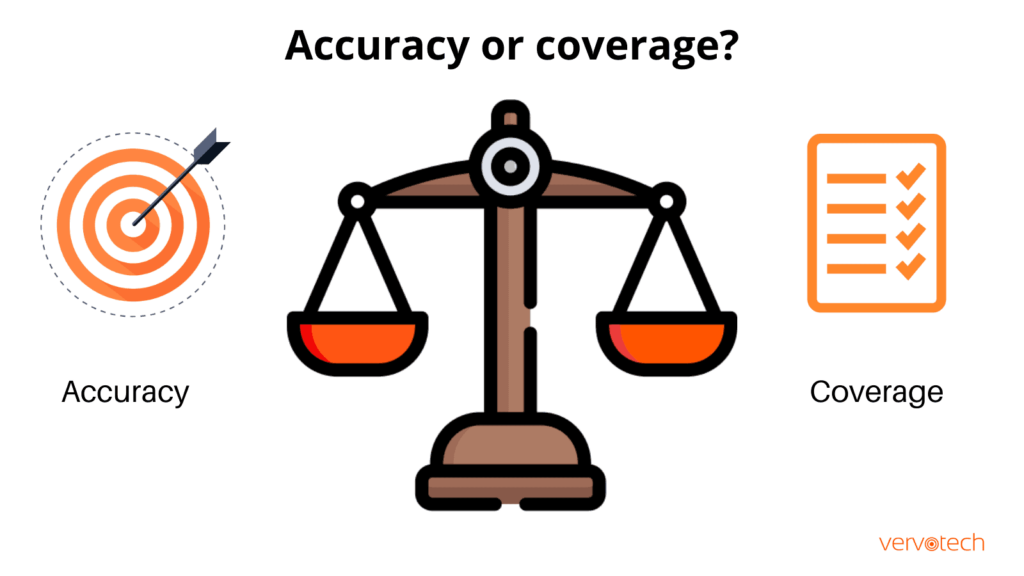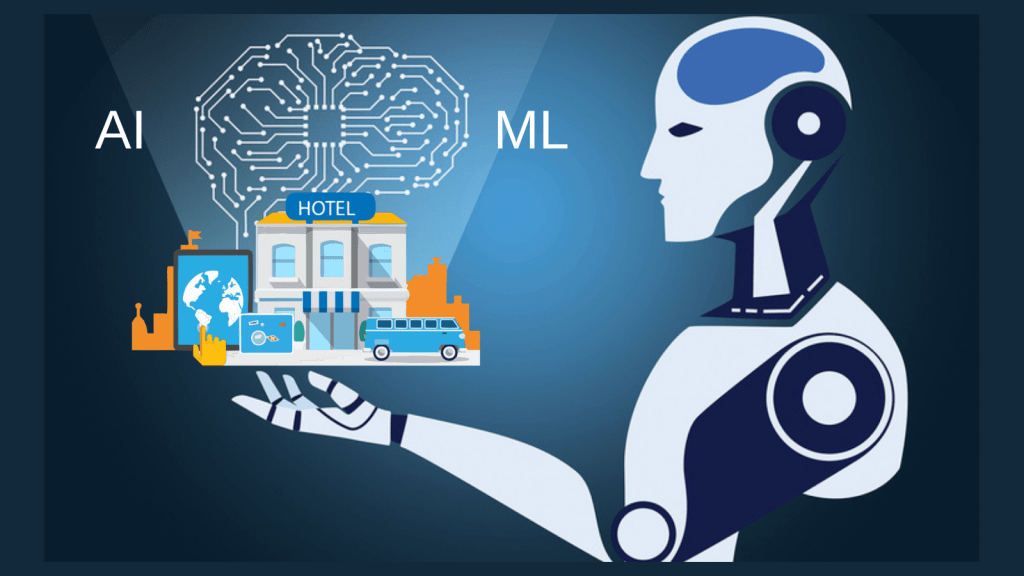Future of Artificial Intelligence in Travel Technology

In today’s digital era, technology is advancing at an agile pace. There is no denying the fact that AI is pretty much changing all aspects of our lives. The role of Artificial Intelligence in the business world has increased dramatically over the last decade. In recent years, the use of Artificial Intelligence has increased in a wide range of industries such as financial services, healthcare, hospitality, travel, retail, manufacturing, and many more. With major advancements in the technological capabilities of businesses, the limits are being pushed harder and further than ever before, and at the core of this new world of possibilities, lies the twin pair of AI and ML, the holy grail and the hottest topic of discussion across global business circles. In the following article, we will look at how travel businesses are using the latest artificial intelligence to learn more about their customers and drive more bookings so as to make the most out of the opportunities provided by new and emerging markets. Only by properly scaling the various operations and the technologies incorporated by businesses can these entities ensure viability and sustainability in the long run. Impact of AI on Modern Global Travel Businesses Artificial Intelligence is expected to drive the travel and tourism industry forward immensely in the upcoming years. Travel technologies are offering a wide range of services such as personalization, customer service, value-added services, alternate options, and many more. Countless travel businesses are increasingly using Artificial Intelligence (AI) to increase personalization, customer loyalty, management, conversion rates so as to not only meet but exceed customer expectations. AI gathers a wealth of valuable data to guide travelers through the entire customer journey, so businesses can use it all in one place to incorporate more personalized services based on the preferences guests have shown you. This gives travelers an enhanced experience driven by predictive services. Recommended: Five Ways World Travel Industry Digitalizing Journeys AI or Artificial Intelligence, as the name suggests, is the simulation of human intelligence by modern machines through the process of repeated learning, correcting, and reasoning. A machine, while being incapable of making decisions by itself, can process a large number of data sets quickly in order to reach certain conclusions. Once such conclusions are met, a machine can quickly identify whether that conclusion is favorable or unfavorable in nature. If the conclusion is unfavorable, the machine can quickly repeat the entire process till a favorable condition is met. Once this condition is met, the machine then registers that process and can apply it each time to reach a favorable conclusion without fail. This is called Machine Learning. Therefore, it can be seen that Artificial Intelligence and Machine Learning are intricately linked to each other where the application of Machine Learning leads to further models of AI with progressive levels of intelligence. We can then safely conclude that Machine Learning is a subset of Artificial Intelligence that continuously feeds computer systems with large amounts of data so that they can build relationships between data-sets and apply the same to the data-sets that are being fed. Hospitality is one of those industries where the rise of technology is having a significant impact on the way hotels function today. Companies, even at the level of individual hotels, are now working alongside or in collaboration with automated digital processes so as to share data among themselves and drive profits. Companies are starting to understand the importance of a seamless customer experience when it comes to availing services in the sector and is increasingly sharing data with each other so as to build symbiotic relationships within the fraternity that benefits all entities involved. Artificial Intelligence technology can be introduced at almost any stage of the traveler’s consumer experience. By introducing AI technology to hotels, nations can reach out to travelers and fulfill their expectations and desires which changes the dynamics of the hotel industry. At the same time, guests are becoming more committed and loyal to hotel brands and would not hesitate to share their experiences with their peers. Travelers who want a more personalized and customized experience in their hotels would spend less time searching for the perfect fit and receive almost tailor-made offers. This increases customer loyalty, drives brand value, and ultimately adds to the profits of the organization. Recommended: The New Traveler Needs Future of Artificial Intelligence in Travel & Hospitality Now that we understand the ways AI can seriously impact business practices and solutions in a modern context let’s focus on the ways companies are using this AI technology to their advantage. As discussed above, AI can automate tasks that traditionally required human cognitive functions thereby saving manpower and resources while reducing errors within the system and speeding up the entire process. We also know by now that customer service and experience are of utmost importance within the travel and hospitality industry and therefore, it comes as no surprise that AI is being increasingly applied in order to properly orient the same according to the needs and the wants of the target market. Some examples of AI that are quite common today are: Chatbots in Online Customer Services Face-to-face customer service Data processing and Analysis Virtual Reality Augmented Reality Internet of Things Voice Recognition and Support Facial Recognition Payment Gateways Recommended: Five Ways World Travel Industry Digitalizing Journeys With opportunities that are as diverse as these, it is easy to understand why companies are becoming more and more reliant on AI and ML to meet all their daily needs. The reduction in errors, operating costs, time, and the overall efficiency of the system is too good to be left alone. Therefore, it is quite understandable that AI will become one of the leading technologies that push the industry to the next digital era. We, at Vervotech, understand the power of technology and are working hard towards providing progressive solutions to everyday problems. Vervotech Mappings, an advanced hotel and room mapping solution, leverages the power of AI and ML to consolidate data from multiple sources and get
How to choose a Hotel Mapping Service?

Choosing a Hotel Mapping Service Provider can be a difficult task. It has been established through multiple years of a process that APIs and data feeds are the lifeblood of travel distribution. Rapid developments in travel technology have enabled businesses to expand their reach far beyond the initial foresight. Therefore, the various entities that are working in this sector must be aware of the advantages that technology provides to their overall campaigns and work towards incorporating these into their existing ecosystem. Hotel Mapping service and Room Mapping service have emerged in the 21st century as one of the leading services in the field that has more or less become a staple over the years. Mapping in the industry ensures accurate and precise data flow between various nodes thus removing duplicate and erroneous listings on any given platform. With modern cloud-based systems being able to handle thousands of transactions simultaneously, the need for proper, updated, and unique listings on one’s platform is greater than ever. When a TMC or an OTA works with multiple suppliers or provides data to multiple other sources, mapping that same data and updating it across all channels can become an extremely tedious process. Hotel and room mapping API leverage the power of AI and ML to automate the entire process so that inconsistencies within the system can be removed with a simple click. However, there are various things that one needs to consider when choosing a hotel mapping service for their business. Since there is a distinct lack of global standards when it comes to content distribution and management, one must adopt a technology that can filter and consolidate all incoming data to get rid of inconsistencies and errors to present the accurate and updated listings possible to end-users. Since the technology is relatively new, there is a need for entities working in this space to understand the advantages that hotel mapping services can provide to them and the ways it can complement their business to generate greater profits. One of the biggest questions that are plaguing companies in the industry at present is – Who is Hotel Mapping and Room Mapping for? To that, we say, everyone! If you are a supplier, OTA, Consolidator, DMC, Tour Operator or an accommodation provider – any entity remotely related selling accommodation, then hotel mapping service and room mapping service are quintessential to the overall development of the business. Not only does mapping cut down on losses through the removal of erroneous listings displayed on your platform, but it also ensures the viability and sustainability of your firm in the long run by building credibility for their brand through the introduction of newer technologies. Another question that we frequently come across is – Are Hotel Mapping and Room Mapping both essential to all businesses in the industry? To that, we say, no! This is the sole reason why we, Vervotech, have decided to develop our Room Mapping and Hotel Mapping APIs as separate entities! The viability of each will always be dependent on your needs and the sector that you work in –e.g., for an online travel agency, it is extremely essential for them to map both hotels and rooms with the same level of vigilance lest they start incurring exponential losses from incorrect listings of each. It is not so much important for independent room providers where they might only have requirements for a room mapping API that essentially helps declutter all information related to the sales of their rooms. Perhaps the most frequented as well as the most important question according to us is – Accuracy vs. Coverage? To that, we say, both! We feel this question is so important that we have an entire blog dedicated to the topic – you can read it in detail here. However, to sum it up for the people blazing through this blog, accuracy and coverage are two sides of the same coin where one essentially loses value without the other. It does not make much sense for one to ensure total accuracy over an extremely limited data pool the same way that it does not make sense for one to cover a wide area without ensuring accuracy. We tend to take this extremely seriously when it comes to the development of our product ‘Vervotech Mappings’ and through a dedicated and sustained effort by the team over the years, have been able to ensure an overall coverage of 98% with an accuracy of 99.999%, the best in the industry!Vervotech Mappings is a leading Hotel Mapping and Room Mapping API that leverages the power of AI and ML to quickly and accurately identify each property listing through the verification of multiple parameters. With one of the industry’s best coverage of 98% and an accuracy of 99.999%, Vervotech Mappings is quickly becoming the mapping software of choice for all leading global companies operating in the travel and hospitality industry. To learn more about Vervotech Mappings and the ways it can enhance your business in the long run contact us: sales@vervotech.com
Hotel Mapping Accuracy vs. Coverage – What’s More Important?

The modern global market is an extensive mix of various factors that are continuously interacting with each other in an ever-increasing manner. It is important that the various entities that are involved in the global market understand the various internal and external factors that are affecting it in order to make the most out of the market. Rapid developments in travel and communication technology have enabled travel businesses to expand their borders into markets that were previously inaccessible. Therefore, if one business is not taking advantage of the various trends and factors that are affecting the global market as a whole, then they are effectively losing business and as a result, profits. The scenario of the modern travel and hospitality industry is no different. If you are a travel and hospitality business that is either providing hotel content to other entities or are consolidating content from different sources, the lack of a global standard is evident. There are no laws that dictate the way that properties are being listed across various platforms that leads to inconsistencies and therefore, an overall loss in the number of conversions. As a result, there is a dire need for travel agencies as well as suppliers to consolidate their content from various data points in order to ensure that there are no inconsistencies when it comes to content that is listed on their platform so as to avoid duplications. Hotel Mapping as a service has evolved over the years with the evolution of travel tech in order to meet these demands that have become a necessity over the years. As people are becoming more dependent on technology for accessing all their daily needs, there is a need for suppliers and travel agencies to also adopt these newer technologies in order to make their services more accessible to the end-users. According to Marvel Puri, VP, Business Development, Vervotech, “Companies are processing more than a billion data points every day, and each data point is adding to the algorithm learning and accuracy. Accuracy ensures that each one of these data points is readily verified and listed without any inconsistencies so that end-users are presented with proper and updated listings.” “Traditional hotel mapping technologies are using cross table mapping that may give you accuracy but very low coverage. A low coverage impacts the access to cheaper rooms and much more”, he added. So, What is Accuracy and Coverage in Hotel Mapping? One of the biggest challenges faced by the travel fraternity is the lack of any global standard when it comes to distributing content. Each channel focuses on its own set of rules when distributing content and this makes it extremely hard for suppliers to consolidate the data that is being sent out. This is where mapping accuracy comes into effect – accuracy in hotel mapping ensures that the data that is being collected from multiple sources are being represented consistently in any given platform so as to avoid confusion and duplication. Similarly, coverage in hotel mapping refers to the amount of hospitality data that is being covered by any given platform. Since the travel and hospitality industry is quite extensive, there is a need for systems to cover each and every supplier of hotel data in order to ensure that the data that is being represented is complete. If the data is not completely represented, then there is a chance of inconsistencies rising from the same. Therefore, it can be clearly deduced that accuracy and coverage are two dependent and interrelated variables where one cannot be clearly established without the other. Without coverage, one cannot guarantee accuracy and vice-versa. In order to properly understand this problem statement better, let’s look at some of the challenges that are being faced by travel agencies as a whole. Some of the challenges that are faced by suppliers and travels agencies presently are: The lack of standardization in descriptive hotel content such as names, addresses, geocodes, star ratings, amenities, and images. Complexity in Hotel ID Mapping when it comes to working with multiple content sources. Complexity in integration with multiple content sources A lack of focus on price when considering competitiveness, coverage, and accuracy There is no single reliable source of data Lack of automated technologies that are able to manage and consolidate large volumes of hotel content via formats such as XML, API, FTP, Feed, Excel files, and other data formats It has been established through years of research and simulation that cross table mapping is a multi-step process, i.e., the travel businesses usually send their data to a data management company which then converts that content into their own set of codes which are then represented in a huge XLS table. This process alone, if not automated, can take up to a month depending on the type of data that is being consolidated. This mapped data that is consolidated is then sent to the various travel businesses for sale on their marketplace. Therefore, it is evident that when a travel business is working with multiple suppliers, then the internal staff needs to manually map the mapped data across all the different supplier’s inventory so as to ensure consistencies across their marketplace. An automated AI-dependent algorithm that instantly maps the data that is being consolidated across various supplier points will readily fasten up the process of mapping. So, what do companies actually focus on? Accuracy or coverage? Various studies have shown that when it comes to hotel mapping, accuracy and coverage are two sides of the same coin. The need for accuracy actually is directly proportional to coverage, so the more area that you cover under your territory, the higher is the need for accuracy, considering that the inconsistencies within listings in properties increase with the increase in density. Vervotech Hotel Mapping is a revolutionary new platform that leverages the power of AI and ML in order to ensure coverage of 98% coupled with an accuracy of 99.99% so that you are certain that all listings that are posted on your marketplace are consistent
How AI and Machine Learning are Enhancing Online Customer Experience in Travel Industry?

The travel industry is forging ahead in terms of technology in a manner that was quite unprecedented even a couple of years ago. Those bygone days are gone when travel industries had traditional ways of selling. This new-age travel industry is one of the industries where the role of AI and Machine learning has increased exponentially in recent times. Today, customers are seeking more data and answers, more quickly from travel companies before making a purchase decision. Hence it has become far more important for all online travel agencies to adopt new hi-tech technologies that can deliver accurate, frictionless, timely, and customized results to their users. Big travel giants like Expedia, Trivago, Hotel.com, Airbnb have an immense set of data, and they need to analyze this data to bode out it through Predictive Analysis, AI and Machine Learning. So, let’s dig deeper and understand how the travel industry is taking the help of AI and Machine Learning technology to enhance the online customer experience. What is Artificial Intelligence? AI or Artificial Intelligence, as the name suggests, is the simulation of human intelligence by modern machines through the process of repeated learning, correcting and reasoning. A machine, while being incapable of making decisions by itself, can process a large number of data sets quickly in order to reach certain conclusions. Once such conclusions are met, a machine can quickly identify whether that conclusion is favourable or unfavourable in nature. If the conclusion is unfavourable, the machine can repeat the entire process till a favourable condition is met. Once this condition is met, the machine then registers that process and can apply it each time to reach a favourable conclusion without fail. This is called Machine Learning. Therefore, it can be seen that Artificial Intelligence and Machine Learning are intricately linked to each other where the application of Machine Learning leads to further models of AI with progressive levels of intelligence. We can then safely conclude that Machine Learning is a subset of Artificial Intelligence that continuously feeds computer systems with large amounts of data so that they can build relationships between data-sets and apply the same to the data-sets that are being fed. So, where is AI is being applied in the travel industry to enhance the overall operations? Let’s look at some examples: 1. Flight and Hotel Price Prediction: Ever wondered how you get the best deal recommendation of hotels or flights out of such a huge pool of data? Well, it’s all because of the powerful AI/ML technology which automatically monitors the market and provides the best hottest deals. Popular booking websites like booking.com and Trivago operate on history and real-time data which keeps their customers on the website for a long time. For Online Travel Agency portals each visitor is a potential customer and no OTA will ever want to lose them. So, to have an edge in their sales OTA’s use the power of AI/ML to hook new customers and to tempt them to book more trips. 2. Smart Travel Assistance and Responsive customer support: In the fast-paced online world, users surf through several sites before making a purchase decision. In this journey, user travel assistance is important for a smooth booking experience. Today most of the OTA’s are leveraging the power of AI virtual travel assistants and interactive chatbot system which provides seamless and easy assistance to users. Customer support plays an important role in the travel industry, where any user can land on the website anytime for a booking. So, to make the customer journey smooth most of the OTAs are integrating chatbots. According to the HubSpot research report, 71% of people use chatbots to solve their problems fast. Chatbots provides full-fledged customer support 24/7 reducing the load of human customer support. AI/ML leveraged chatbots are an interesting way to keep users engaged and optimize various aspects of customer service. Through a custom programmed chatbot, users can get basic information and answers to FAQs for a smooth user experience. 3. Opinionated Content for Customers: Do you ever leave a site because of inappropriate data shown to you which is not relevant to what you are searching for? Well, this is one of the major pain points for most of the OTA. Today users want relevant and accurate data in less time, and for this OTAs are taking the help of AI/ML. 4. Duplicity Free Content: Imagine you are looking for an exciting awaited trip but while booking online, the same hotel was listed multiple times with different rates. So, would you like to purchase from that booking website? No right? Most of the OTA’s source their hotel data from multiple suppliers. While sourcing the data, multiple suppliers have the same hotel listings with variable rates. 5. Reducing Management Issues: AI/ML technology also helps travellers while travelling. The predictive analysis provides an edge to prevent the hindrances that might come in the way of travellers and hampers their smooth journey. 6. Customized offers for customers: Who doesn’t like loyalty programs? In the travel industry providing special customized offers to customers is the icing on the cake. Today OTAs take the help of AI/ML technology to gather the details of customer behavior and activities and provides them with specially tailored offers. This not only improves the customer experience but also retains loyal customers in the long run.Vervotech Mappings is a leading Hotel Mapping and Room Mapping API that leverages the power of AI and ML to quickly and accurately identify each property listing through the verification of multiple parameters. With one of the industry’s best coverage of 98% and an accuracy of 99.999%, Vervotech Mappings is quickly becoming the mapping software of choice for all leading global companies operating in the travel and hospitality industry. To learn more about Vervotech Mappings and the ways it can enhance your business in the long run contact us: sales@vervotech.com


